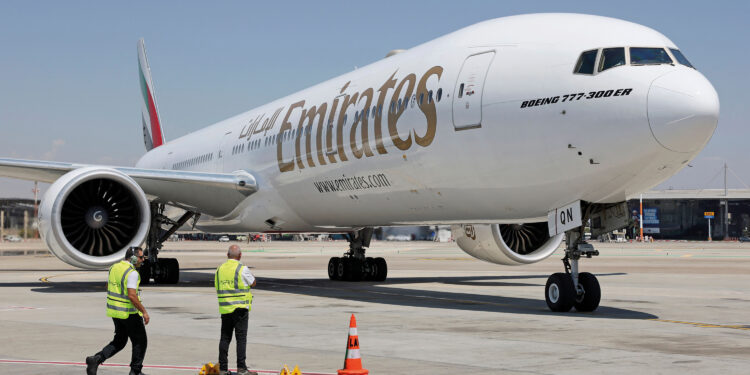Airlines’ $6bn trapped cash problem
Back in February, Nigeria’s then-president Muhammadu Buhari phoned his UAE counterpart, Sheikh Mohamed bin Zayed Al Nahyan, and requested that national flag carrier Emirates resume flights to Africa’s largest economy. One of the world’s biggest airlines, Emirates has suspended all flights to Nigeria since November 3 in protest of the total $812m worth of funds which are unable to be repatriated, owned by it and other airlines operating in the country.
“I assured Sheikh Mohamed that the fund repatriation issues … are receiving appropriate attention,” Mr Buhari tweeted on February 14. In May, an Emirates spokesperson told fDi that “despite public assurances made at the highest levels”, they had “seen little progress in the clearing of our … substantial balance of blocked funds”.
At the forefront
Emirates’ withdrawal from Nigeria is the highest-profile example of a bigger problem. According to the International Air Transport Association (IATA), airlines are waiting to repatriate a total $6bn from 30 countries around the world.
Excluding the $3.8bn stuck in crisis-stricken Venezuela since 2016, the total value of so-called ‘blocked funds’ — which are spread across Africa, the Middle East, Asia and Latin America — has risen by more than one-third since mid-2022.
The barrier is capital controls: a variety of tools used by governments to ration access to foreign currency. In most advanced markets, companies convert and move cash abroad without government intervention. But in developing markets that struggle to generate hard currency, this can be a lengthy and uncertain process involving transfer-specific licences, winning a central bank auction and then waiting to receive the funds.
Emerging markets’ dollar shortage, caused by a combination of factors including rising interest rates and the Covid-19 pandemic-induced slowdown in global trade and tourism, is causing central banks to prioritise allocations to essential imports and sectors. Aviation is not considered an essential sector.
Venezuela aside, IATA’s latest figures (at time of writing) show that Nigeria is the biggest offender, followed by Bangladesh, Algeria, Pakistan and Lebanon. Since January, the latter two countries have reduced their balance of trapped funds. But IATA’s director general, Willie Walsh, warns that blocked funds is a recurrent issue. “You get a government acknowledging that there is an issue, they start addressing it, and that gives some confidence to airlines,” he notes. “And then the problem reoccurs.”
While the problem can affect any foreign investor, airlines’ business model makes them particularly vulnerable. They sell tickets in the currency of where the journey begins, but pay for fuel, aircraft maintenance and other major expenses in dollars.
“More than 50% of the costs associated with any flight is dollar-denominated,” says Mr Walsh. In an inherently cross-border business in which revenues are earned in myriad local currencies, funds must regularly be exchanged and repatriated to cover their overheads.
Flights grounded
Airlines are accustomed to dealing with small sums being tied-up for short, finite periods of time, says aviation consultant Sean Mendis. “But [not] when it is open-ended and there’s no real clarity on when the situation is going to get better,” he adds. It means the financials of routes that are profitable on paper do not stack up. “If you can’t repatriate your money, you’re providing a service for no [financial] return,” says Mr Walsh.
Airlines are responding by increasing fares, using smaller aircrafts, reducing frequencies and — in the case of Emirates — cutting routes.
The problem is exacerbated by the industry still recovering from the pandemic. “There is a real risk to countries with trapped funds that airlines may move much faster than they have historically to reallocate capacity to other markets,” says Mr Walsh.
An airline client of Mr Mendis’s has pushed back expanding into Malawi — where $52m is blocked, according to IATA — until the foreign exchange (forex) situation improves. “They saw the business viability, but the dealbreaker is that it’s very difficult to get hard currency out,” he says. When Mr Mendis was chief operating officer of Africa World Airlines from 2018 to 2020, the Ghana-based carrier’s planned expansion into Nigeria was also put on hold because of repatriation concerns.
In Bangladesh, where $214m is trapped, over the first half of this year, “many airlines” dropped their weekly flights into its capital Dhaka from 14 to as low as five, says Abdus Salam Aref, secretary general of the Association of Travel Agents of Bangladesh. “It put huge pressure on us,” he says. “It was alarming.”
Warning signs
While fewer flights may be an obvious risk to the travel industry, the ramifications reverberate across local economies.
Although it would be nearly impossible to establish a clear causal link between air connectivity and foreign direct investment (FDI), research has shown a positive correlation between the two. A study published in the European Transport Research Review in 2014 found that two years after the opening of 629 new routes into Italy, FDI flows between the country and its new connections increased by 33.7%.
Air connections are arguably even more important in developing regions like Africa, where three-quarters of airlines’ trapped funds are located today. “[The continent] needs foreign investors for its economic development,” says Abderahmane Berthe, secretary general of the African Airlines Association.
Trade is also impacted. According to IATA, 35% of worldwide trade by value is carried by air; fewer flights therefore mean higher costs. “Cargo is the lifeblood of the airline system. Even if a flight doesn’t have a lot of passengers, it could still be heavy on cargo,” says Andy Menkes, CEO of travel management firm Partnership Travel Consulting.
Mr Berthe notes that trapping cash also sends the wrong message to foreign firms. “If you want a foreign investor to come and do business in your country, you need to create conditions for them to repatriate their profits,” he says.
While the aviation business model has put the industry at the forefront of repatriation woes, there are signs that more foreign investors in other industries may soon start encountering the problem.
When interest rates were low, bringing cash home — particularly from countries with capital controls and high withholding taxes — often was not considered worth the time and expense, says Naresh Aggarwal, associate director at the Association of Corporate Treasurers. “[But] over the past couple of years, with interest rates rising, we’ve seen a greater interest among treasurers in repatriating cash,” he says. “Borrowing money in their headquartered country and holding small cash balances everywhere else is no longer economic.”
This trend is exacerbated by this year’s collapse of Silicon Valley Bank and Credit Suisse which, Mr Aggarwal says, have reinforced the importance of centralising cash to manage counterparty risk. To ensure other industries do not follow the lead of aviation and start reducing their local footprint, governments would be well advised to reassess their forex strategy — and trim the $6bn they owe airlines in arrears.








